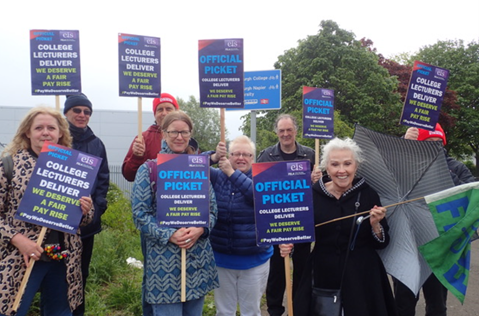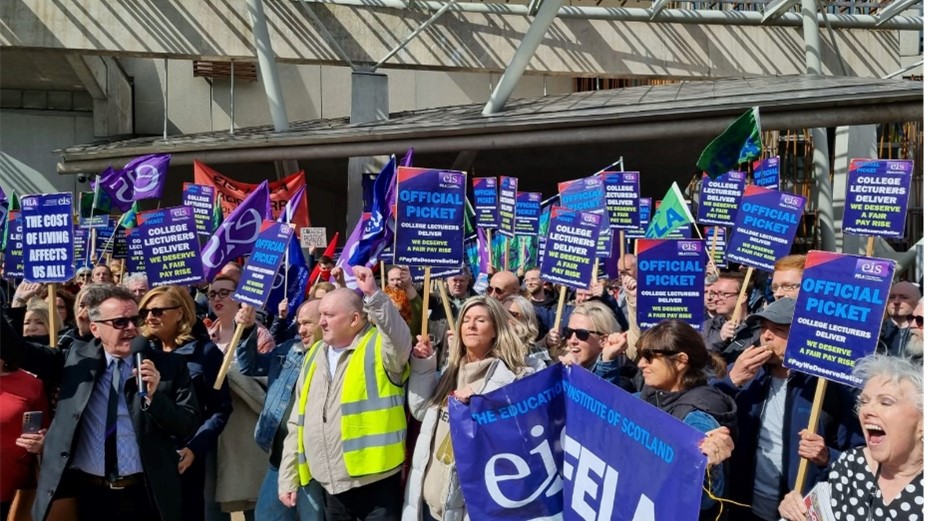Find out more about The Open University's Social Sciences courses
This article belongs to the Women and Workplace Struggles: Scotland 1900-2022 collection.

Lecturers took strike action for an annual cost of living pay rise, for fair pay in other words. The strike followed a ballot with 73.3 % voting for strike action and action short of a strike (ASOS), on a 51.9% turnout (thereby achieving the threshold for industrial action under the Conservative UK Government anti-trade union laws) (EIS.org, 2022a). The background to this pay dispute is that the negotiators representing Colleges Scotland employers refused to increase their offer of £850 or ‘budge’ on a one-off thankyou payment to college lecturers in recognition of their work during two years of COVID-19 lockdowns during 2020 and 2021 (College Employers Scotland, 2022). The employers insisted the proposed one-off payment would not be consolidated into the lecturers’ cost of living pay uplift. This was despite the union negotiators reducing their cost-of-living claim of £2,000 to £1,300 (EIS.org, 2022b).
 Striking lecturers on a picket line at Fife College Halbeath Campus,
Dunfermline, May 2022 (Image: Lynn Rooney)
Striking lecturers on a picket line at Fife College Halbeath Campus,
Dunfermline, May 2022 (Image: Lynn Rooney)This ‘offer’ was made by the employers against an economic backdrop of steeply rising inflation. To many college lecturers it seemed that the employers were quibbling over the previous year’s pay claim in the face of now runaway inflation. During the lockdown thousands of lecturers had turned their homes into offices. They daily dealt with students’ mental health issues while developing new teaching materials and methods. At the same time, they juggled family and other commitments (often simultaneously). The one-off payment was therefore seen by many lecturers as a slap in the face, an insult.
 EIS FELA strikers on picket line duty,
Edinburgh College, May 2022
(Source: EISFELA @Twitter)
EIS FELA strikers on picket line duty,
Edinburgh College, May 2022
(Source: EISFELA @Twitter)Strike action commences
EIS FELA members engaged in one day of strike action, initially on 20 April and escalating to two days on 26 and 27 April and 4 and 5 May 2022. A further three days of strike action was planned for the following weeks. Despite repeated attempts to negotiate, the employers’ side simply left the negotiating table, claiming that they were unable to provide a date for a further meeting. In short, they became unavailable. At this point members suspected that the employers simply wanted to ‘bust’ the union, and the dispute was no longer solely about demands for a cost of living pay rise. Despite it being seven years since the introduction of national bargaining in the college sector, EIS FELA members were forced by their employers to ask the Scottish government to intervene. Only once during the seven years of national bargaining has there been a reasonable offer from the employers’ side with no government intervention required. Lecturers have repeatedly highlighted the continuing opposition to and resentment of national bargaining by the employers’ side. Once in an ‘all-powerful’ position, more and more college principals still struggle to accept that they no longer independently control their respective ‘fiefdoms’ but are accountable, ultimately to the Scottish government and to the Scottish taxpayer.
In response to the employers’ side tactic of being unavailable for talks, lecturers convened a mass open online meeting to discuss tactics to tackle employer intransigence. Lecturers adeptly switched gear and changed the pattern of strikes to lessen the impact on students and themselves by slowing the pace of strikes with a new focus on ‘digging in’ (EIS.org, 2022c). On 12 May 2022 lecturers, joined by sympathetic MSPs, the National Union of Students and fellow trades unionists, lobbied the Scottish parliament to campaign for a political solution to the stalemate. Lecturers announced outside the parliament the immediate commencement of a results boycott.
Employers react to growing support for action
 EIS FELA members protesting outside the Scottish Parliament,
Edinburgh May 12, 2022 (Image: Lynn Rooney)
EIS FELA members protesting outside the Scottish Parliament,
Edinburgh May 12, 2022 (Image: Lynn Rooney) Watch: Facebook
Following the protest outside the Scottish parliament, the employers responded (via Twitter) that they would meet with the union negotiators once more. This may have been in response to the lobby of the parliament. It may have been due to increasing difficulties of collecting exam results from a determined and united workforce. It could have been that numbers on picket lines were not receding but instead they were growing. Branches reported attracting new people, who had previously never been involved in taking direct action. It could have been in response to the news that universal strike pay was now claimable by every member commencing on 17 May (EIS.org, 2022d). The employers’ seemingly sudden availability could have been in response to a combination of all these factors but whatever the reason, it was the first time since the beginning of the dispute that the employers’ side had requested a meeting.EIS FELA accepted the request. The outcome of that meeting was nil. The strikes scheduled for the 17 and 25 May went ahead. The ‘resulting’ boycott commenced in earnest as the deadline for entering exam results grew ever closer. EIS FELA offered to suspend scheduled action on 30 May, to allow a meeting to take place. At this meeting an offer was made to consolidate the one-off payment of £150 into the cost-of-living uplift. Further action was suspended allowing a ballot of members to take place. 90% voted to accept (EIS.org, 2022e).




Rate and Review
Rate this article
Review this article
Log into OpenLearn to leave reviews and join in the conversation.
Article reviews